Marine collagen, sometimes also called fish collagen, is a compound extracted from fish bones, skin, and scales that is a key building block for healthy muscles, bone, cartilage, and skin in your body.
Marine collagen contains specific subtypes of collagen that are not found in other sources like cow, chicken, or vegan collagen, so it’s a great addition to your supplement routine if you want the broadest range of types of collagen.
Looking to sustain high levels of collagen in your body for healthier connective tissue? Look no further—our research team has ranked and reviewed the ten best options on the market, plus provided an in-depth analysis of who should use marine collagen and why.
Research
Rankings
1. Sports Research Marine Collagen Peptides
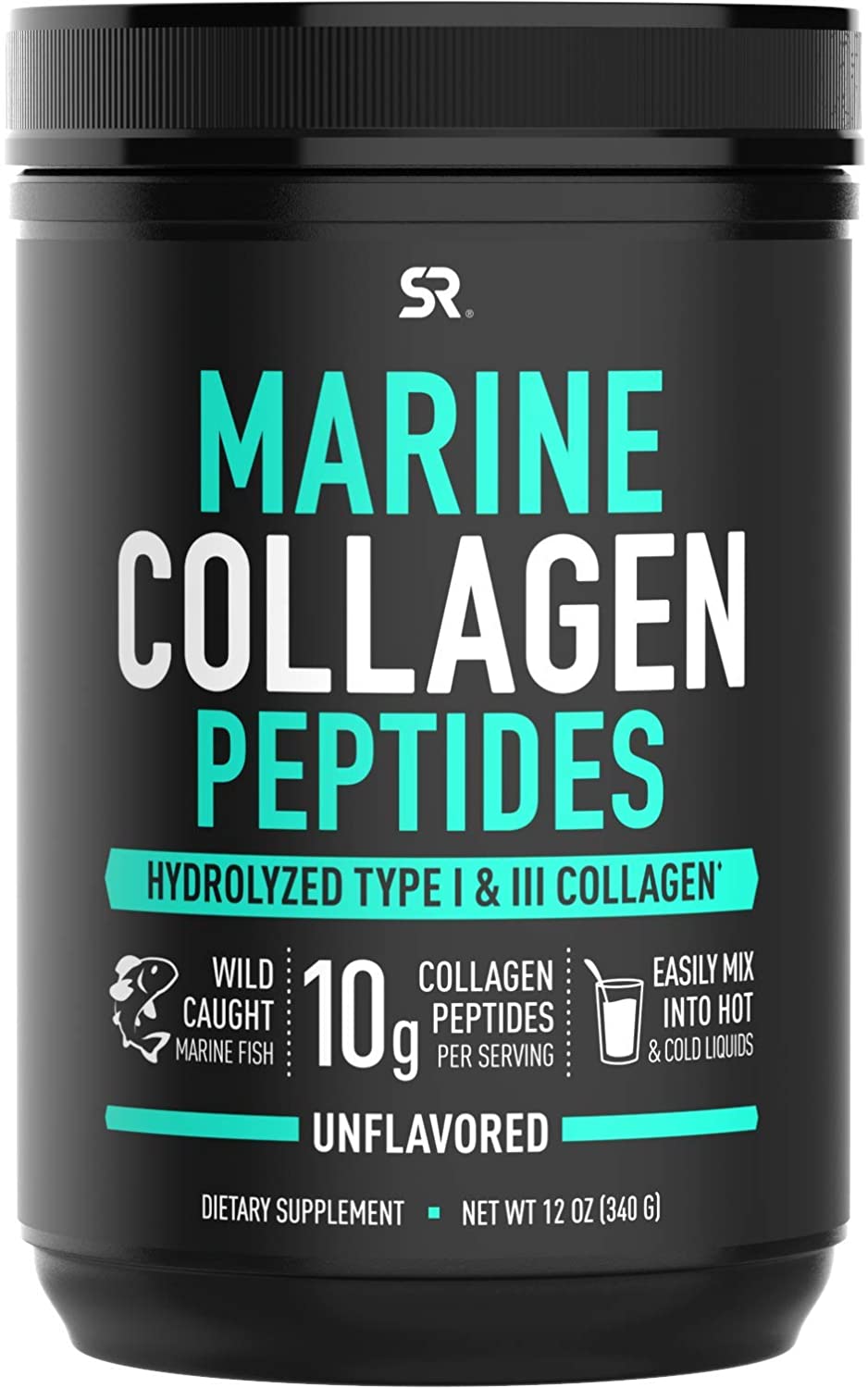
Sports research makes a simple, unflavored marine collagen from wild-caught fish. It provides a robust amino acid profile and has abundant amounts of both Type I and Type III collagen.
It’s a great option for a simple and effective powder-form fish collagen supplement, and thanks to its careful sourcing and high-quality collagen content, it garners the top spot in our rankings.
2. Vital Proteins Marine Collagen
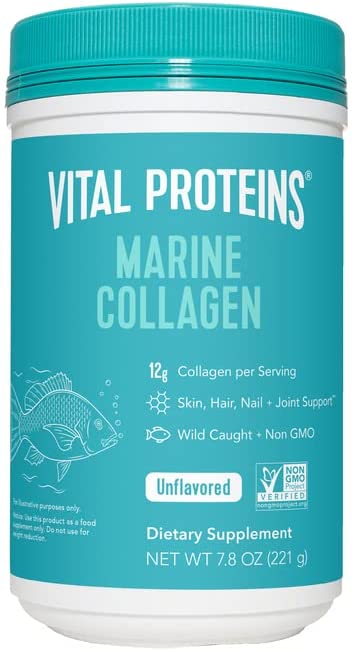
Vital Proteins makes an excellent marine collagen powder that’s unflavored, wild-caught, and has a great amino acid profile. It’s finely powdered and easy to add to hot or cold drinks, so it goes equally well with coffee or a protein shake.
The focus on purity, simplicity, and careful sourcing make it one of the best options out there.
3. Youtheory Marine Collagen
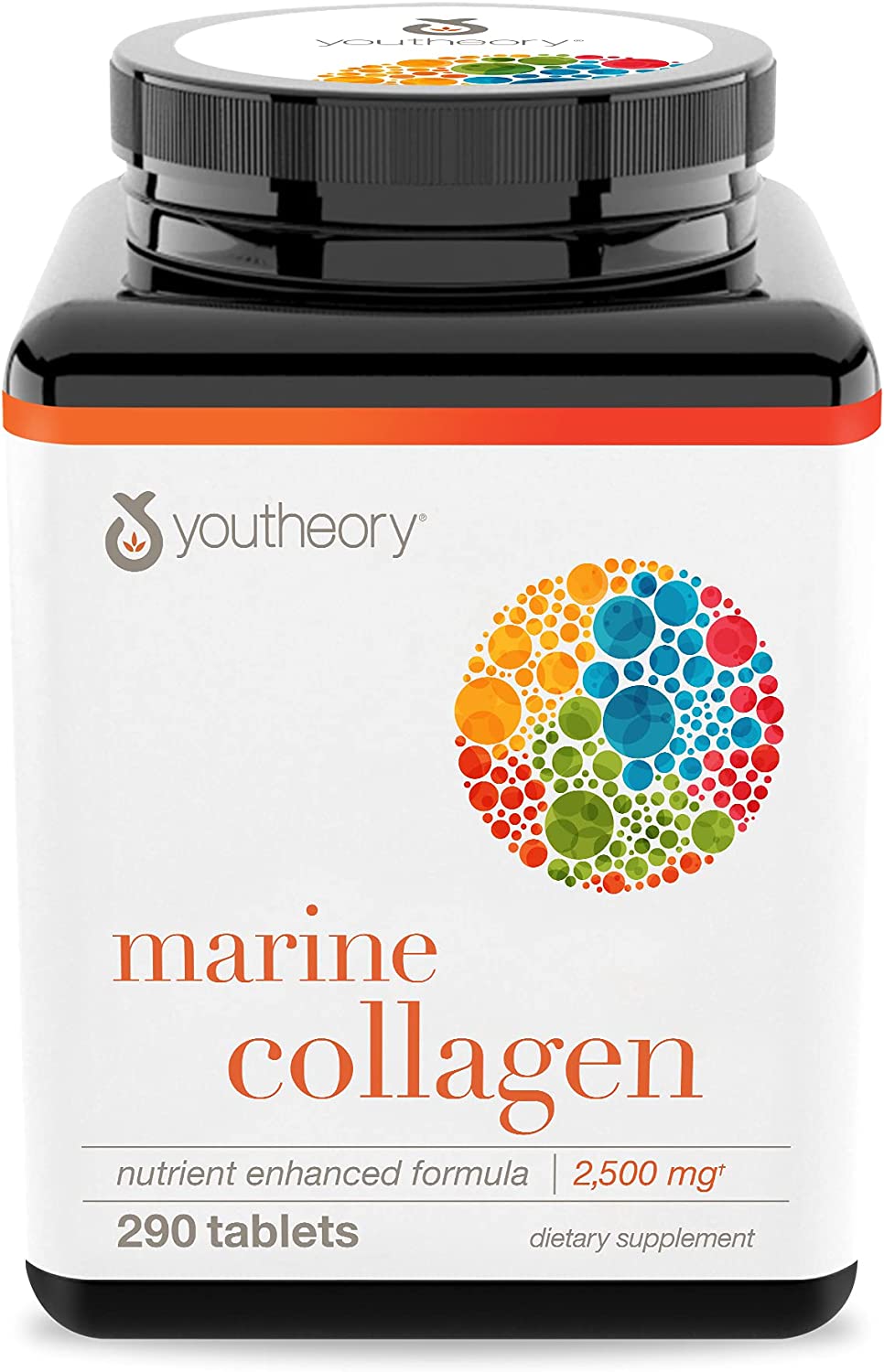
Youtheory makes one of our favorite capsule-based marine collagen supplements since its formulation is so focused on healthy skin and healthy joints. It combines collagen from tilapia and catfish with a few other key ingredients for skin and joint health: silica from horsetail extract, selenium, zinc, and the antioxidants vitamin A and vitamin C.
If you need a dead-simple supplement to add to your routine for healthier skin and joints, look no further than Youtheory.
4. Nature Force Marine Collagen Peptides
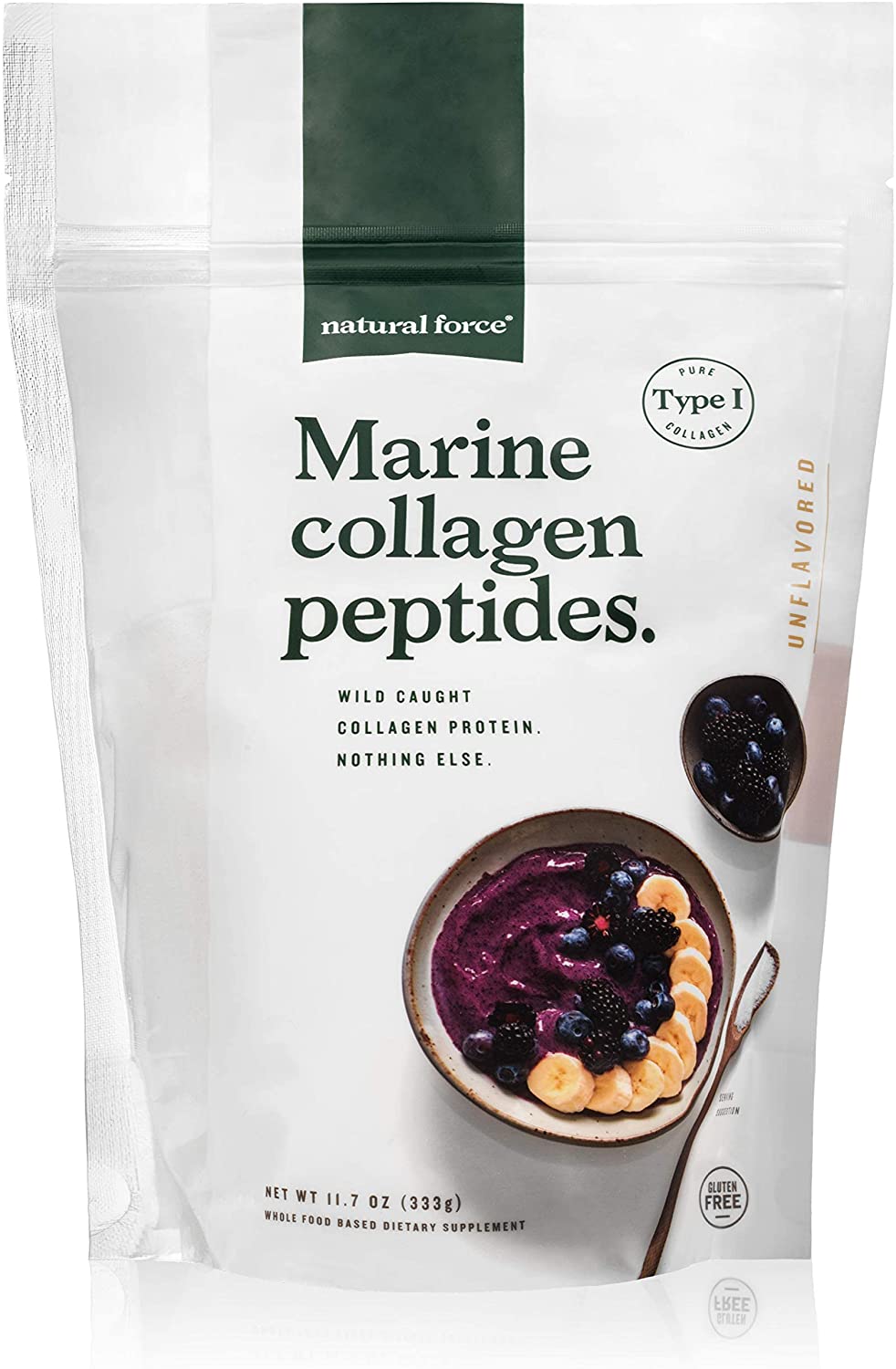
Nature Force’s fish collagen is unflavored and sourced from wild-caught cod. It provides a high concentration of Type I collagen and a complete amino acid profile. When it comes to simple, powder-form marine collagen, you can’t go wrong with Nature Force.
5. Collazing Wild Alaskan Marine Collagen
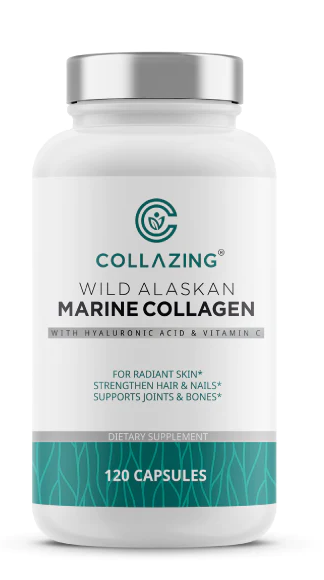
Collazing is one of the few capsule-based fish collagen manufacturers to put a focus on collagen quality at the forefront of their product. This wild-caught collagen from pollack provides marine collagen alongside vitamin C and hyaluronic acid, which makes this supplement equally well-suited for skin health and joint health.
6. Neocell Marine Collagen
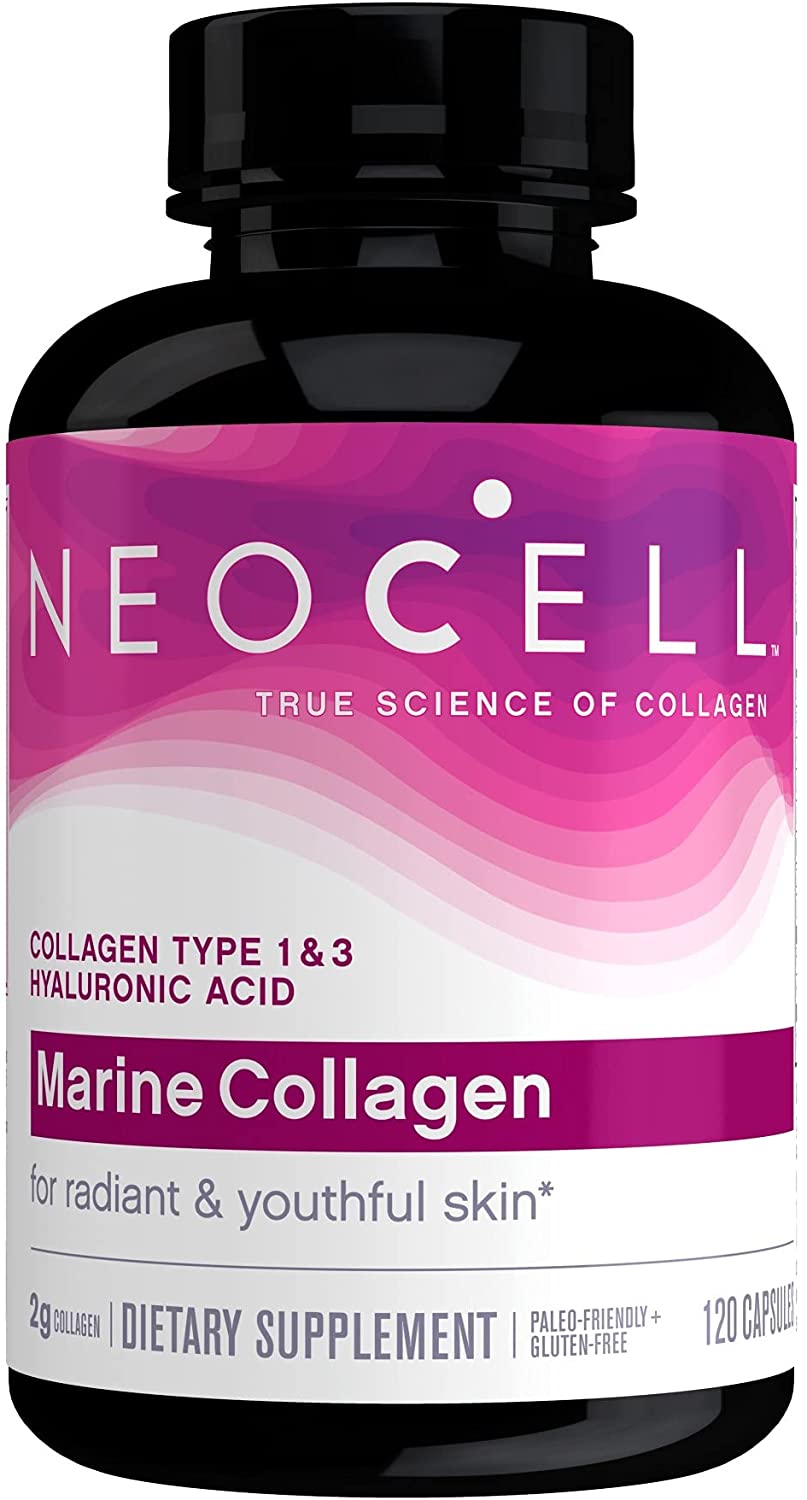
Neocell is a capsule-based collagen supplement that combines fish collagen providing Types I and III collagen alongside a blend of trace minerals, vitamins, and hyaluronic acid, a compound that promotes joint health.
The additional trace minerals and hyaluronic acid are nice additions, and the capsule format makes it super convenient to take. The primary downside with this supplement is that its collagen comes from just one source (carp) and is not wild-harvested. So, if you’re looking for the highest-quality wild-caught fish collagen, other supplements might be a better option.
7. Anthony’s Marine Collagen Peptides
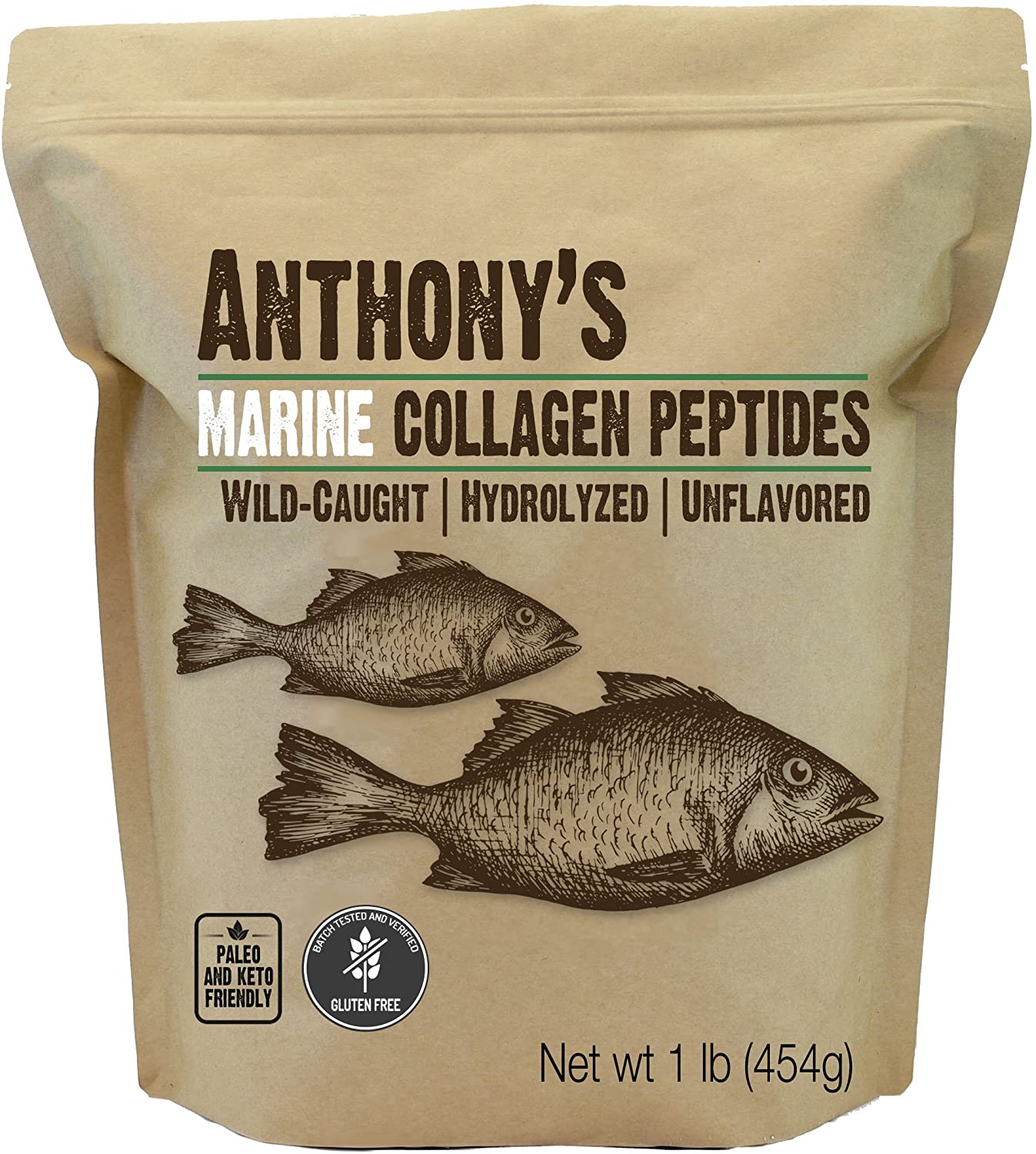
Anthony’s is a brand that reliably produces simple and pure powder-form supplements, and their marine collagen is a perfect example of this approach.
This collagen supplement is derived from wild-caught fish and focuses on providing Type I collagen, which is by far the most abundant in the human body. While there are other options with a broader range of collagen types, Anthony’s is still a solid pick if Type I collagen is your priority.
8. Amandean Marine Collagen
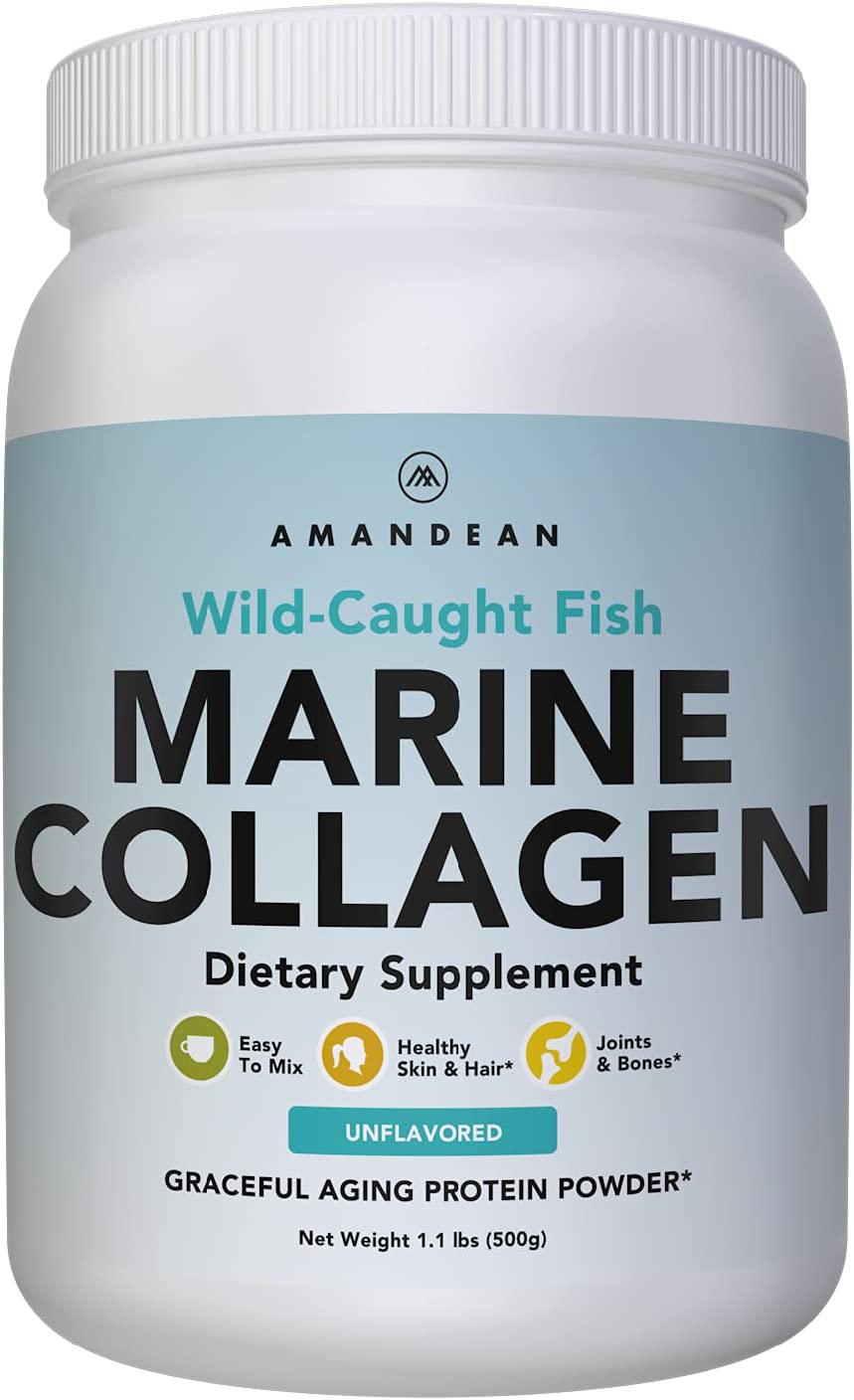
Amandean makes a simple and straightforward marine collagen supplement that’s easy to add to hot or cold beverages.
The fish collagen included in this supplement is wild-caught, but Amandean doesn’t provide as much info on the exact source of their collagen as other manufacturers do. Still, it’s a solid option if all you need is a simple fish collagen powder.
9. Andrew Lessman Marine Collagen Peptides
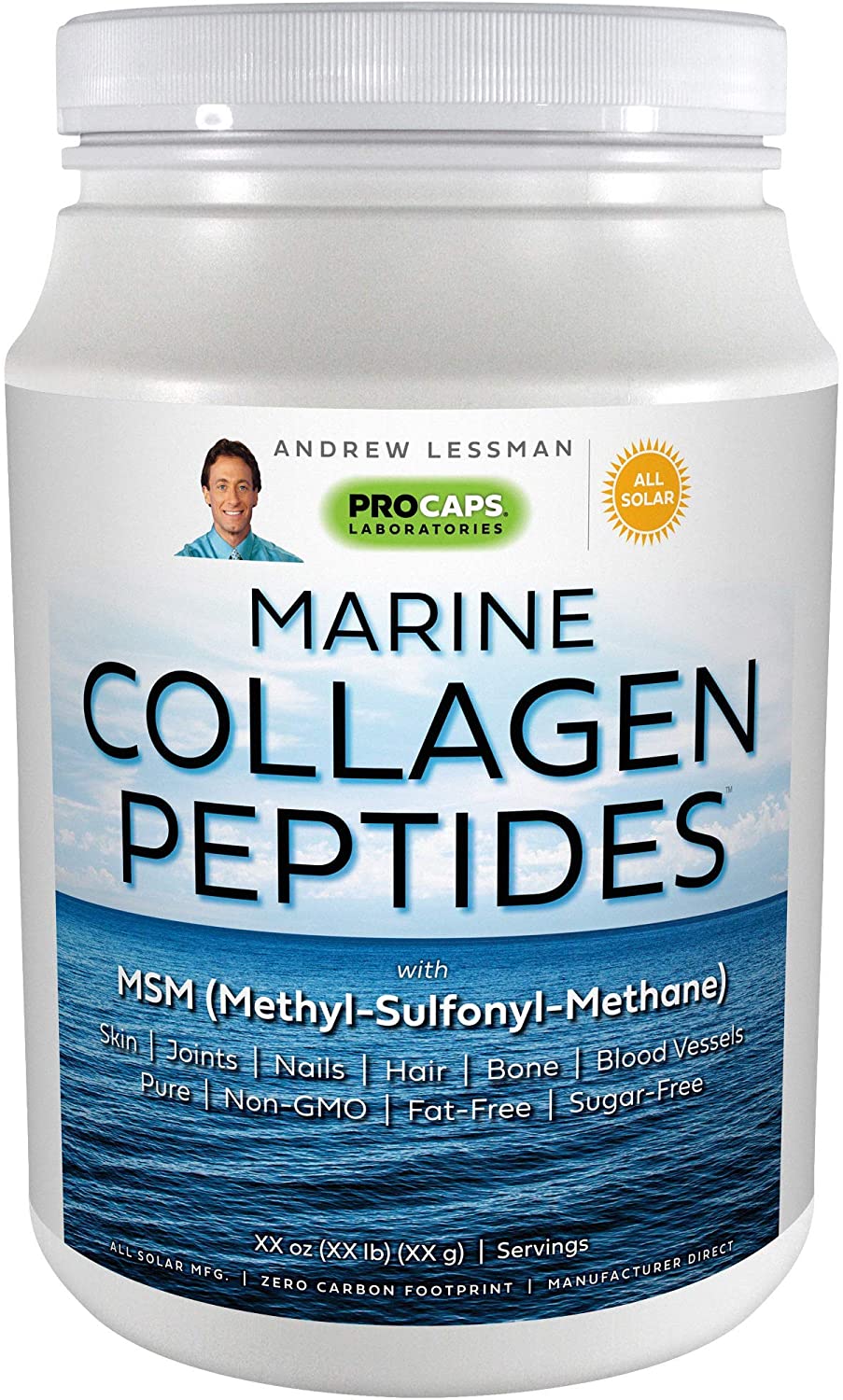
Andrew Lessman comes in quick-dissolving capsules that you add to water or any other beverage of choice. It gives you the simplicity of a pill-based supplement but the simplicity of a powder-based supplement.
While the tilapia-derived collagen in this marine collagen supplement is nothing special, the formulation does add in the joint supplement MSM, making this a decent choice if joint health is your focus.
10. Wild Fuel Marine Collagen Liquid
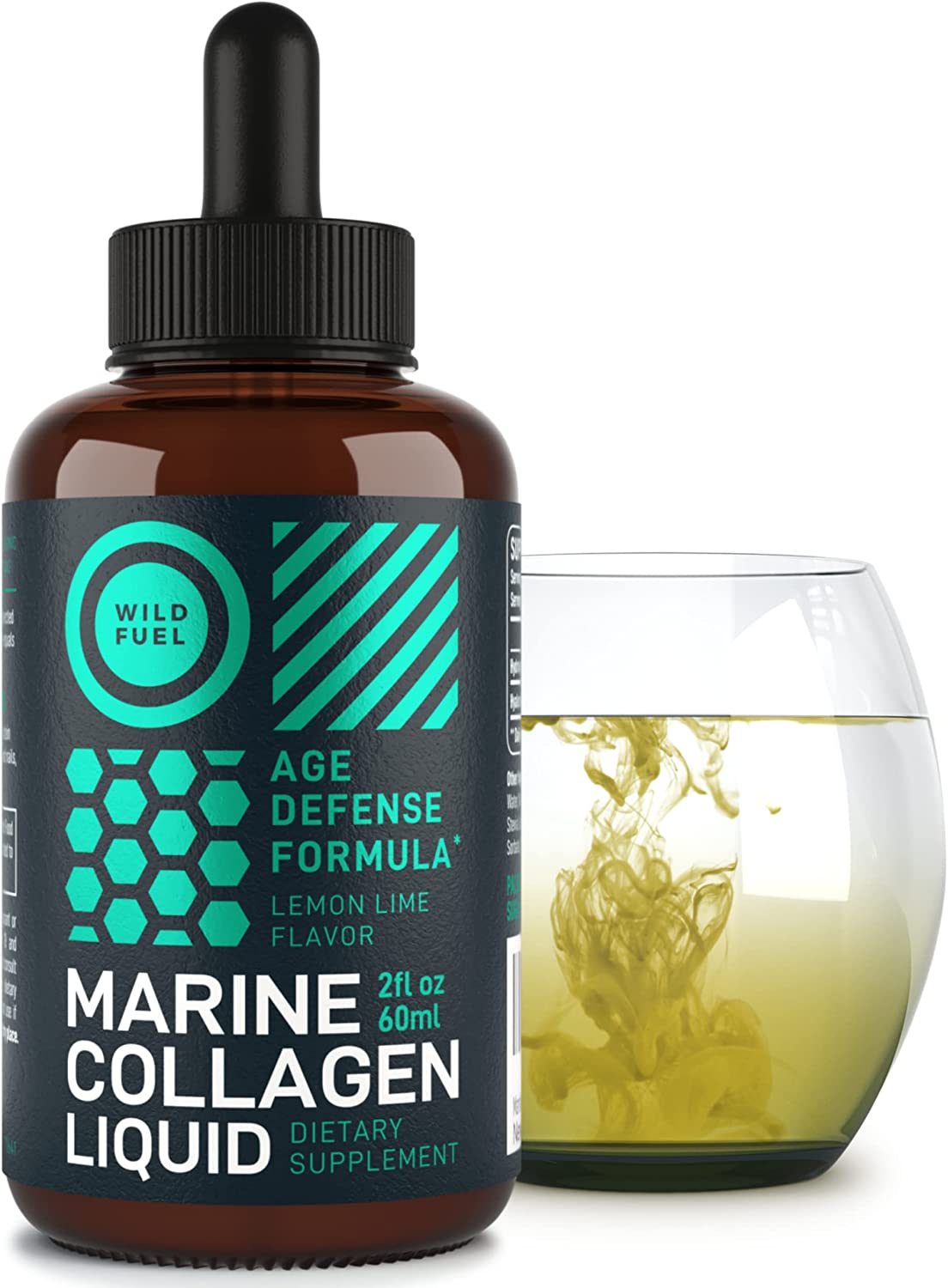
Liquid marine collagen is a niche product with only a few brands producing quality products, but Wild Fuel is one of them. This marine collagen comes dissolved in water, with hyaluronic acid added for joint and skin health, plus citric acid, stevia, and lemon flavoring to mask some of the fishy taste of unflavored marine collagen. Even so, some users still complain about the flavor, and for most people, a powder-form or capsule-based marine collagen supplement is a better choice.
Category winners
Best marine collagen overall: Sports Research Marine Collagen Peptides
Sports Research takes our top overall spot thanks to its focus on high-quality sources for its collagen. By using two different types of fish (barramundi and red snapper), Sports Research delivers both Type I and Type III collagen, giving your body a broader range of building blocks for skin and other connective tissue. This focus on quality ingredients propels sports research to the top of our rankings.
Best marine collagen for better skin: Youtheory Marine Collagen
Youtheory provides high-quality fish collagen alongside other essential ingredients for healthy skin, like selenium, silica, and vitamin C. As a capsule-based supplement, it’s also super easy to incorporate into your daily routine. These properties make it our recommendation if you want an easy way to use marine collagen for healthier skin.
Best marine collagen for joint health: Sports Research Marine Collagen Peptides
Even though other marine collagen products have ingredients that are specifically tuned for joint health, like MSM and hyaluronic acid, the raw amount of collagen you can get with a powder-based collagen supplement is just so much higher that for most people, it’s better to take a dedicated powder-form collagen product and supplement with MSM, hyaluronic acid, or another joint supplement if necessary.
Sports Research is the best powder-form marine collagen out there, and it delivers a high dose of high-quality Type I and Type III collagen for strengthening your cartilage and improving joint health.
Best marine collagen pills: Youtheory Marine Collagen
If you want the convenience of a capsule when taking marine collagen, Youtheory Marine Collagen is the way to go. These capsules provide fish collagen alongside other key ingredients for skin and joint health: silica, selenium, and vitamin C. These additional ingredients help augment the gains in skin and joint health that you get from the dual-sourced fish collagen in Youtheory Marine Collagen.
Best marine collagen with hyaluronic acid: Collazing Wild Alaskan Marine Collagen
Collazing Wild Alaskan Marine Collagen is one of the few marine collagen supplements that provides hyaluronic acid alongside high-quality collagen from wild-caught fish. If you specifically want hyaluronic acid for joint health alongside marine-sourced collagen, Collazing is definitely the way to go.
Best marine collagen for older adults: Sports Research Marine Collagen Peptides
Collagen production declines later in life, which might explain why older adults have less healthy skin and connective tissue. Our top pick, Sports Research Marine Collagen Peptides, is a great choice for older adults looking to keep their collagen levels high, thanks to its combination of Type I and Type III collagen sourced from two different kinds of wild-caught fish.
Who should buy marine collagen?
Marine collagen is a rich source of proteins that serve as building blocks for connective tissue inside your body. For this reason, it’s a great choice if you are looking to improve skin health, reduce wrinkles, counteract joint pain from arthritis, or reduce pain from sports injuries. Marine collagen is a particularly strong source of Type I collagen, which makes up the vast majority of the collagen found in your body.
Collagen levels inside your body decrease as you get older, which might explain why older adults have less healthy and elastic skin, more painful joints, and worse connective tissue integrity. Taking marine collagen as part of your daily supplement routine is one way to counteract the decrease in collagen levels that occurs with age.
Marine collagen is also a good option for people with joint pain. Collagen from any source is a popular ingredient in joint supplements, and collagen makes up the majority of the cellular structure of your joint cartilage.
Supplemental collagen containing the kind of Type I collagen that’s abundant in marine collagen has been successfully investigated as a treatment for both osteoarthritis and rheumatoid arthritis, suggesting that marine collagen could have potent effects either repairing damage to cartilage or reducing inflammation in cartilage that contributes to joint pain.
Marine collagen is also a great supplement if you want to improve your skin health. One of the main areas of focus of research on collagen supplementation has been on its ability to strengthen and improve the elasticity of skin: as you age, and as you are exposed to more ultraviolet light from the sun, your skin’s collagen breaks down.
Research on collagen supplementation suggests that adding collagen to your routine can counteract this breakdown, helping to make your skin look and feel younger and more elastic.
Lastly, collagen supplementation is also a popular option among people looking for healthier nails, hair, and tendons. The rationale for this use-case is motivated by the benefits of collagen for skin and for joint cartilage.
Since both of these connective tissues are made up of collagen, and collagen supplementation appears to benefit both skin and joints, it follows that collagen supplementation should be helpful for other connective tissue as well, including nails and hair.
While there’s less research on this front, marine collagen users nevertheless report experiencing stronger, less brittle hair and nails after several weeks of taking collagen as a part of their diet, making it an attractive option for people looking for healthier hair and nails.
How we ranked
To formulate our rankings, we started by collating a wide range of marine collagen-based products on the market. We organized these by supplement type, separating out collagen powder, collagen capsules, and liquid collagen solutions. Each of these has slightly different use-cases, so we first ranked products within their respective category before assembling the overall rankings.
Within each category, we rewarded marine collagen products that came from wild-caught fish, as opposed to farm-raised fish. We also rewarded products that were clear about what types of fish their marine collagen came from, with extra points going towards products from multiple kinds of fish, since this increases the diversity of collagen types and sources in the supplement.
For powder-based marine collagen supplements, we put an additional premium on purity: we only ranked products that were 100% pure collagen, with no added flavoring or additional ingredients.
Powder-form marine collagen is the most versatile form of collagen, and many people interested in using it are going to add it to their own custom shakes and smoothies, so purity is of the utmost importance here. That’s why Sports Research and Vital Proteins made their way to the top of our rankings.
Though in principle marine collagen can come from either fish or other marine animals like sea urchins and jellyfish, all of our top-rated products were sourced from ocean-caught fish.
Though they deliver a lower dosage, capsule-based marine collagen supplements are more convenient and are better candidates for adding in additional supplements alongside marine collagen. For these products, we applied the same analysis of collagen sourcing, rewarding products that were wild-caught from specific fish species.
In addition, we rewarded supplements that paired marine collagen with other supplements useful for joint and skin health, like vitamin C for antioxidant protection and hyaluronic acid for reducing joint inflammation.
These additional ingredients, found in products like Youtheory Marine Collagen and Collazing Wild-Caught Alaskan Marine Collagen, have the potential to amplify the benefits of marine collagen, so they made their way to the top of the capsule-based collagen sub-category.
Capsules that contained too much in the way of unnecessary additives, binders, and preservatives fell in the rankings, or got dropped entirely.
Liquid marine collagen supplements are best used in niche cases for people who can’t or don’t like to take capsules, but who also don’t want to bother mixing up their own powder-form marine collagen into coffee, tea, shakes, or smoothies.
We applied many of the same criteria of purity and quality sourcing to liquid collagen supplements, though many products didn’t make the cut. We did reward products that included other beneficial compounds like vitamin C and hyaluronic acid.
One additional consideration for liquid collagen was taste–unlike capsules, liquid collagen can take on an oily, fishy taste, and some products do a poor job attempting to mask this taste with other ingredients. This dropped several liquid collagen candidates from our rankings, leaving only Wild Fuel Marine Liquid Collagen (and even it ended up at the bottom, because of the lingering fishy flavor).
To combine products across categories, we weighted each marine collagen product by how broadly useful it would be to the typical user. Since powder-form marine collagen is so versatile and because our top powder-form products were also 100% pure collagen, with no unnecessary additives, these came out on top.
Capsule-based marine collagen with the most useful added extras, like the silica and selenium in Youtheory, and the vitamin C and hyaluronic acid in Collazing, came in next, thanks to their tremendous usefulness for joint and skin health.
Other powder-form marine collagen and capsule-based marine collagen with more generic formulations or more niche use cases trailed, with the best liquid collagen (Wild Fuel) bringing up the rear for the reasons outlined earlier.
Benefits
Marine collagen can reduce joint pain from osteoarthritis. The cartilage that makes up the articular surface of your joints is made from collagen, and sustains damage that causes joint pain in both rheumatoid arthritis and osteoarthritis. The fact that collagen is the basic building block for cartilage motivated a huge amount of research into whether natural sources of collagen protein, like marine collagen, could improve function and reduce pain in people with arthritis.
A recent review article by researchers in the United Kingdom and published in the Journal of Arthritis in 2017 summarizes the findings to date (1). After reviewing a huge range of randomized controlled trials and animal model studies, the authors concluded that oral collagen supplementation is an effective way to reduce pain caused by osteoarthritis. Various studies found decreases in arthritis-related pain by up to 70-80% after six months of supplementation with collagen.
Some research suggests that marine collagen could also reduce pain from rheumatoid arthritis, but these findings are less clear. The same review study also looked at a range of clinical studies on rheumatoid arthritis, which is caused by an immune reaction to cartilage in your body (in contrast, osteoarthritis is caused by direct damage to your cartilage).
Unlike the findings on collagen for osteoarthritis, the findings for rheumatoid arthritis were more conflicting. Some studies found a significant effect of collagen supplementation on rheumatoid arthritis pain, and pointed to decreases in circulating levels of inflammatory markers in the body as evidence.
However, other studies found that oral collagen supplements did not improve rheumatoid arthritis, especially when compared to traditional pharmaceutical treatments. The authors of the review article point out that more research is needed, especially since some of the mechanistic studies on collagen have shown promising effects, like beneficial changes in immune function, in animal models of rheumatoid arthritis.
Marine collagen could help make your skin look younger and feel stronger. Your skin relies strongly on collagen for its structural integrity, and one of the cardinal signs of aging is deterioration in the collagen of your skin. For this reason, marine collagen has attracted a lot of attention as a possible way to repair and heal skin damaged by aging.
Scientific research by dermatologists points to three primary changes in skin induced by collagen supplementation: improved skin elasticity, better skin hydration, and higher collagen density in the dermis (the layer of “true skin” that contains a the dense matrix of collagen-based connective tissue).
A review of 11 different studies, totaling over 800 experimental subjects, was published in 2019 in the Journal of Drugs in Dermatology (2). Across the range of studies, which lasted between four and 24 weeks, the researchers pointed to empirical evidence showing that, compared to a placebo, taking a collagen-based supplement increases the elastic properties of skin, restoring it to a more youthful state.
Additionally, collagen supplementation increased the water content of skin, meaning the skin was better-moisturized. Finally, the density of collagen itself was increased in the collagen-rich dermis layer of the skin, confirming what we’d suspect–taking supplemental collagen leads to more collagen being deposited into the structural matrix that gives the skin its strength.
Marine collagen can help reduce pain from sports-related injuries and speed recovery from exercise-related soreness. Spurred by the success of using collagen to reduce joint pain from arthritis, a raft of recent research has investigated using collagen to treat joint pain and soreness caused by sports injuries and exercise as well.
The findings here are quite promising: a meta-analysis in 2021 that included 15 different randomized controlled trials found that collagen supplementation improves joint function and reduces joint pain in athletes with injuries that cause joint-related pain (3).
Additionally, some research indicated that collagen supplementation could reduce exercise-related muscle soreness, though the results were not as robust as those indicating collagen’s benefits for joint pain.
Notably, these studies on sports-related joint pain used fairly high dosages of collagen: ten to 15 grams per day, in most cases. This suggests that fairly high levels of collagen intake might be necessary to see a significant benefit when it comes to joint pain caused by exercise.
Marine collagen could benefit hair and nail strength, but the evidence is not as strong as the evidence for skin and joint health. Much of the buzz online about collagen supplements generally and marine collagen in particular concerns its benefits for nail and hair health.
Many health experts think that the same benefits of collagen for skin and joints should extend to hair and nails, since they are made up of many of the same structural proteins.
However, scientific researchers have cautioned against jumping to conclusions on this front. A brief review by researchers at Northwestern University published in 2021 contrasted the relatively limited experimental evidence on collagen for nail and hair health (which is promising, but very much preliminary) against the media image of collagen supplements, which often portrays them as a miracle-fix for brittle nails and dry hair (4).
The most important takeaway is that the research is still very limited on this front when it comes to marine collagen. Some small studies do show promise: one open-label, uncontrolled experiment, for example, found that taking a collagen supplement for 24 weeks increased nail strength and decreased chipped nails, though without a control group it’s hard to separate this from a placebo effect (5).
Another study pointed to improvements in hair strength with a specific collagen preparation (6) taken for 16 weeks.
While these results suggest more research should be done on taking collagen for hair and nail health, they’re still a far cry from the large meta-analyses of many different studies that support using collagen for joint pain and skin health.
Side effects
Some sources say women who are pregnant should not take marine collagen. Fish and other ocean-sourced foods are a common source of allergens, and because of the immune system changes that happen during pregnancy, some health experts recommend avoiding marine collagen when you are pregnant.
However, there isn’t much medical literature on the topic. The rationale for avoiding marine collagen during pregnancy does not have to do with the safety of the collagen in the supplement itself, but because of the potential risk (albeit a small one) of an immune system reaction to traces of fish protein that are left over in the supplement.
Marine collagen could trigger seafood or shellfish allergies. Since marine collagen is sourced from fish, it should be no surprise that it can trigger seafood allergies.
Shellfish allergies are also a risk, since some marine collagen is sourced from non-fish marine animals, and often lower-quality products have murky supply chains that could mean that collagen from a wide range of marine creatures could make its way into your supplement.
If you have a seafood or shellfish allergy, it’s just better not to chance it: opt for a vegan collagen supplement or a bone broth supplement instead–you’ll get much of the same benefit without the allergen risk.
Marine collagen supplements can cause mild gastrointestinal issues. As with many supplements, even those sourced from natural foods, marine collagen can sometimes cause bloating or other mild gastrointestinal issues.
One study identified nausea, flatulence, and indigestion as potential adverse effects caused by collagen supplementation, pegging their incidence at 0.5-1.5% of all users (7). These effects are mild, and are also seen in other collagen-based supplements like collagen peptides.
Recommended dosage
Since the research on collagen supplementation for health is fairly new, the typical dosage used in scientific studies is all across the board. For skin health, a range of studies cited in a review article by researchers at Drexel University and published in the Journal of Cosmetic Dermatology used daily dosages ranging from one gram to ten grams of collagen per day (8). Studies using this range of dosages found significant improvements in skin moisture, wrinkle appearance, and skin elasticity.
For joint health and recovery from sports injuries, a different review article published in 2021 in the journal Amino Acids surveyed 15 different studies on using collagen in athletes, elderly adults, and recreationally active people (9).
Several of these studies found improvements in joint pain, muscle soreness, and joint inflammation. Dosages in these studies tended to be higher, with many studies using up to 15 grams of collagen per day, and one study using 20 grams per day.
These findings suggest that using marine collagen for joint health and sports injury recovery might call for higher doses than using marine collagen for improving skin health and reducing wrinkles.
There’s less evidence on the right dosage range for using marine collagen for hair and nail health, but using dosing guidelines from research on skin is a good place to start: five to ten grams of collagen per day are typical dosages used in research on skin health, which seems as good a place as any to start for nail and hair health.
For all-purpose use, starting with a dosage of 2.5 grams of marine collagen per day and ramping up if necessary is a good plan. This dosage is safely in the middle of the ranges used for both skin health and joint health in scientific research, and is easily achievable regardless of your method of delivery (powder, capsules, liquid marine collagen).
If you aren’t getting the results you want after a few weeks, you can up your dosage to ten or 15 grams of marine collagen per day. These higher dosages are best achieved with powder-form marine collagen products, since it would require a huge amount of capsules to get up to 15 grams per day.
While research is spotty on how to break up your marine collagen dosage throughout the day, some data suggest that it is better to spread your marine collagen out into three doses per day instead of just one.
A paper on the use of collagen supplementation for reducing the signs of aging published in 2014 showed that collagen levels in the body peak about two hours after taking a dose, then decline to about half that level by four hours post-ingestion (10).
From this information, it follows that taking one third of your total collagen dosage in the morning, one third in the afternoon, and one third in the evening or before bed would maximize your exposure to high collagen levels inside your body.
FAQ
Q: Is powdered marine collagen better than marine collagen pills?
A: Whether you take marine collagen in powder or capsule form, you’re still getting the same compounds. However, our rankings team had a slight preference for powder-form marine collagen.
That’s because it’s easier to take higher doses of collagen with a powder-based supplement, and much of the newer research on using collagen for skin and connective tissue health is using fairly large doses of ten to 15 grams of collagen per day.
While it’s possible to get that from a capsule, you end up taking a lot of them. For people who want additional nutrients alongside collagen, though, like vitamin C or hyaluronic acid, pill-based marine collagen is a good option. These additional nutrients can enhance the skin and joint health benefits of marine collagen.
Q: Where does marine collagen come from?
A: Marine collagen is harvested from marine animals: almost always fish, but in principle it can also be sourced from sea urchins, jellyfish, and other ocean-dwelling organisms.
All of our top-ranked marine collagen supplements come from wild-caught fish, and raw collagen is harvested from their skin, bones, and scales. Sourcing marine collagen from these different tissues ensures a diversity of different collagen types in the final product.
Q: How do you take marine collagen powder?
A: Most people prefer to mix marine collagen powder into either a warm beverage (like tea or coffee) or a protein shake or smoothie. It’s fine to mix it into plain water, too, though the taste and texture are pretty bland. For highly pure marine collagen powder, there’s much less of a fishy taste than you’d expect: since the collagen is powdered, filtered, and purified after harvesting, surprisingly little remains except highly pure collagen.
Q: When should you take marine collagen?
A: Since collagen levels rise and fall fairly quickly after taking a marine collagen supplement, it’s best to spread your collagen dosage out throughout the day into two or three separate doses.
After taking a single dose of collagen, levels of collagen in your body reach a maximum after two hours, then drop by about 50% after the next two hours (11).
Structuring your marine collagen supplementation schedule so you have six to eight hours between doses is the best way to take advantage of the absorption dynamics and maximize collagen levels in your body.
Q: How long does it take for marine collagen to work?
A: Most of the tissues in your body that use collagen grow and repair themselves relatively slowly, so marine collagen could take several weeks to start showing an effect.
Indeed, most research on using collagen supplementation for joint pain and sports injuries have been studies that last between six and 12 weeks. Research on using collagen for skin health has lasted for similarly-long periods, with the typical study lasting between eight and 12 weeks.
If you are taking marine collagen and aren’t seeing an immediate effect, you should keep these findings in mind: it may take six weeks or more to start seeing the benefits of marine collagen, and getting the full effect could take several months (a few of the successful studies on collagen supplementation have lasted up to six months!).
Q: What is the difference between marine collagen and collagen peptides?
A: Marine collagen is a type of collagen peptide. Collagen can come in two forms: gelatin and hydrolyzed collagen. Collagen peptides are a term for the broken-down components found in hydrolyzed collagen, and since marine collagen is itself hydrolyzed during the manufacturing process, all marine collagens are collagen peptides (and all marine collagen is hydrolyzed as well).
Q: Is marine collagen better than bovine collagen?
A: In terms of their collagen content, marine collagen is pretty similar to bovine collagen. Both have high levels of Type I collagen, which is the most common in your body and which is probably the most important for skin and joint health. Both also contain smaller amounts of Type III collagen, which is used in bone marrow.
Fish and bovine collagen differ in how much and what kind of other types of collagen are present, but these are in trace amounts and are not likely to have a major impact on the health benefits of collagen.
Q: What types of collagen are in marine collagen?
A: Marine collagen is mostly Type I collagen, which is also the most abundant form of collagen in your body’s connective tissue. Like bovine collagen, marine collagen also contains Type III collagen, which is used by your body in bone cells and bone marrow.
Q: Is marine collagen the same thing as fish collagen?
A: In principle, it’s possible to get marine collagen from non-fish sources (like jellyfish or sea urchins), but in practice these terms are more or less interchangeable.
All of our high-quality marine collagen supplements are sourced from fish, since it’s easier to verify their sourcing (e.g. by checking if the fish were wild-caught or farm-raised) and since deriving your collagen from fish allows you a wider variety of collagen sources, by getting collagen from multiple different species of fish.
Q: Where does fish collagen come from?
A: Fish collagen is harvested by soaking fish scales, bones, and skin in a solution, then purifying and powderizing the collagens that are extracted from the raw material. In this way, fish collagen is very similar to bone broth, which has high levels of animal collagen (either bovine or chicken, depending on what type of bones are used to make the broth).
Related articles
Recap
Marine collagen is a great supplement to take for skin and joint health. Collagen sourced from fish is rich in Types I and III collagen, which may help your skin look younger and less wrinkled, and your joints feel less painful.
It’s also popular for nail and hair health, and is also a good choice for athletes looking to reduce pain and hasten their recovery from sports injuries.
Though it should not be taken during pregnancy, marine collagen has little else in the way of side effects, and is a great choice as a supplement in its own right, or as an ingredient in a protein shake or smoothie.
For BodyNutrition’s #1 marine collagen recommendation, click here.